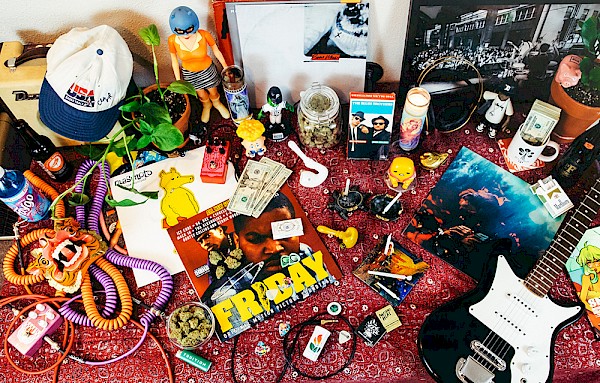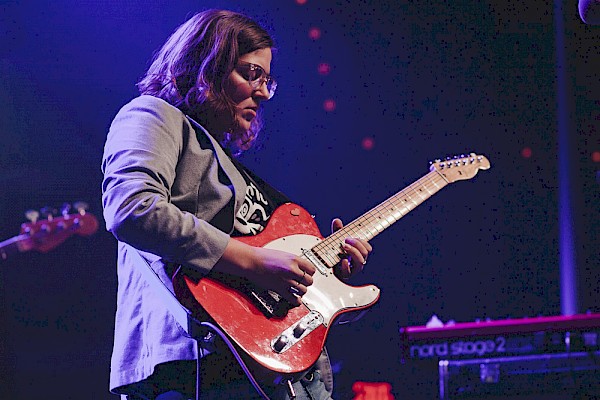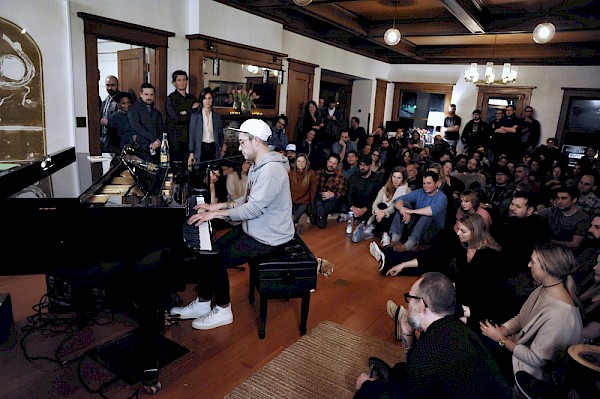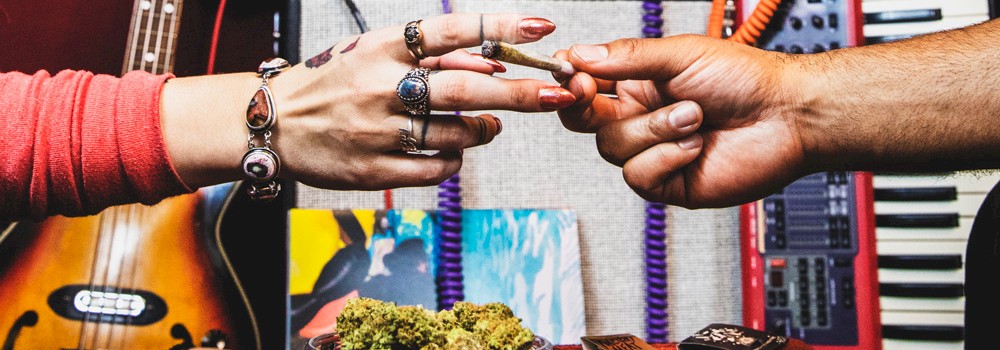 Oregon's cannabis industry supports locals artists—photo by Sam GehrkeMusic and marijuana go together; they were meant for each other like Johnny and June. Since I started smoking pot, it has been a centerpiece in my musical development. I would sit and smoke and listen to Neil Young’s Live at Massey Hall and feel like I was listening to music for the first time. It shaped the way I played and approached music, but it has also helped me pay my rent as a broke musician living in Portland.
Oregon's cannabis industry supports locals artists—photo by Sam GehrkeMusic and marijuana go together; they were meant for each other like Johnny and June. Since I started smoking pot, it has been a centerpiece in my musical development. I would sit and smoke and listen to Neil Young’s Live at Massey Hall and feel like I was listening to music for the first time. It shaped the way I played and approached music, but it has also helped me pay my rent as a broke musician living in Portland.
Being a musician is a great job. You get to travel the world, meet other various wandering types, and be enriched by other cultures. You can live in a world of your own making—where being different is not only allowed, it’s encouraged. There are clichés about sex and drugs that aren’t always true but sometimes feel like they are. You get to feel that feeling of being on stage and connecting with a group of people through your own music.
 Brad Parsons at the Wonder Ballroom in 2018—click to see more photos by James KempThe job title of musician doesn’t come without a significant number of sacrifices. You’re tired and stuffed in small spaces with other tired humans. Your relationships are a little more difficult to maintain and your love life is often a drag. You spend more time at gas stations than anyone should, some you even start to recognize, and worst of all, you are poor most of the time. As times change and technology takes over our lives, musicians are still figuring out how to survive in an oversaturated world. With streaming services paying mere fractions of a cent per stream, it is harder than it has ever been to get by making music. More and more, musicians need side hustles.
Brad Parsons at the Wonder Ballroom in 2018—click to see more photos by James KempThe job title of musician doesn’t come without a significant number of sacrifices. You’re tired and stuffed in small spaces with other tired humans. Your relationships are a little more difficult to maintain and your love life is often a drag. You spend more time at gas stations than anyone should, some you even start to recognize, and worst of all, you are poor most of the time. As times change and technology takes over our lives, musicians are still figuring out how to survive in an oversaturated world. With streaming services paying mere fractions of a cent per stream, it is harder than it has ever been to get by making music. More and more, musicians need side hustles.
The cannabis industry has been a great source of income for countless musicians on the West Coast. As a young musician making my way over the last decade or so, I have been hard up for cash more times than I can count. But trimming weed, working in the garden, or playing parties and events put on by marijuana growers have helped so many of us broke, wandering minstrels make ends meet.
When tour ended, many of us retreated from city life to go to trim camps up and down the coasts of Washington, Oregon and Northern California. In some places, you would tent camp with a group of as many as 50 people. You would get up early and go sit in a garage, hearing nothing but the snipping sounds of small trimming shears and seeing the green bits of weed fall into plastic bins to be collected in bags and sent off to be made into oil. At some grows, you would sit in a house with three or four friends and listen to music or watch movies. We laughed a lot at those grows and were stoned pretty much all of the time. At night after trimming, we would all make dinner and get to sitting around and playing instruments and trading songs.
 Mimi Naja of Fruition at the Crystal Ballroom in 2018—click to see more photos by Blake SourisseauIn the days before recreational use caused the price per pound to drop, you could make up to $200 for trimming a pound of cannabis, and a hardworking trimmer could do two pounds in day. You were isolated, making money every day for several weeks. Some musicians could sustain themselves for several months on what they would make in a few weeks trimming weed. Mimi Naja, songwriter and mandolin player in Fruition, is one of them. “I don’t think I could’ve jump-started my career without harvest season on the West Coast,” she says. “For several years, I counted on going on the hill, not only to make more money off the books than I could anywhere else, but also to be out there off the grid with nowhere to spend it.”
Mimi Naja of Fruition at the Crystal Ballroom in 2018—click to see more photos by Blake SourisseauIn the days before recreational use caused the price per pound to drop, you could make up to $200 for trimming a pound of cannabis, and a hardworking trimmer could do two pounds in day. You were isolated, making money every day for several weeks. Some musicians could sustain themselves for several months on what they would make in a few weeks trimming weed. Mimi Naja, songwriter and mandolin player in Fruition, is one of them. “I don’t think I could’ve jump-started my career without harvest season on the West Coast,” she says. “For several years, I counted on going on the hill, not only to make more money off the books than I could anywhere else, but also to be out there off the grid with nowhere to spend it.”
When I was figuring out how to get out of the workforce and into the tour van, I met a young grower by the name of Patrick Pooler, now owner of Heroes of the Farm. A grow operation near Sandy, Ore., with an outstanding view of Mount Hood, Pooler gave me a job at his farm that was flexible, working around my touring schedule and allowing me to make quick money if I was behind on rent or my phone bill. This immediate cash infusion was absolutely essential for me. I could live a somewhat normal lifestyle and keep at my regular road grind.
“I had my farm going and a lot of side work for people when it came to trimming,” Pooler explains. “Back then, I was able to be flexible with everyone’s schedules. So if you were not on tour and needed to work, I always opened my farm up. This led to an amazing dynamic and many friendships.”
 Patrick Pooler of Heroes of the Farm surveys his grow operation, which has financially supported numerous musicians over the years—photo by Jake GravbrotAt Pooler’s farm, he would throw a party after every fall harvest as a thank you to his employees. It was also a chance for us musicians to be creative outside of the realm of a typical show experience. We would often experiment with new songs, sounds and musical ideas. At one particular farm party, the players on stage would rotate to their left and switch instruments with each song. It was a time where we pushed ourselves in new directions. Hippies would hide in the woods while we were set on a stage in a field and could play with no volume or time restrictions—a psychedelic experience that could pay your rent for two months.
Patrick Pooler of Heroes of the Farm surveys his grow operation, which has financially supported numerous musicians over the years—photo by Jake GravbrotAt Pooler’s farm, he would throw a party after every fall harvest as a thank you to his employees. It was also a chance for us musicians to be creative outside of the realm of a typical show experience. We would often experiment with new songs, sounds and musical ideas. At one particular farm party, the players on stage would rotate to their left and switch instruments with each song. It was a time where we pushed ourselves in new directions. Hippies would hide in the woods while we were set on a stage in a field and could play with no volume or time restrictions—a psychedelic experience that could pay your rent for two months.
“It’s the highlight of my farm,” Pooler says of the farm parties. “It’s special on so many levels. It’s a coming together and a celebration of life. The bands have no expectations. It’s free-flowing and truly a side of the bands that you would never see at any venue.” Pooler is also currently in the process of building an outdoor music venue on his property where he will host festival-type events three to five times a year.
Heroes of the Farm aren’t alone. Ties between local growers and the music community are strong. Hood River’s Bula Farms and rapper Myke Bogan are creating a special strain that will be released with his new record later this year, while the founders of HiFi Farms have roots in the music business from their days running a record label in Athens, Ga., before getting into the marijuana industry. From collaborating with Portugal. The Man on a custom pre-roll blend to throwing house shows where you can watch a string quartet and smoke a joint at the same time, HiFi Farms has encouraged cross-pollination between the local music and cannabis scenes.
 Portugal. The Man’s Kyle O’Quin paired classical works by Beethoven, Chopin and Rachmaninoff with cannabis strains from HiFi Farms to raise money for local nonprofit My Voice Music at SE Portland's historic Harry McCormick House in 2017. Local luminaries Stephen Malkmus, China Forbes of Pink Martini and Drive-By Truckers’ Patterson Hood have also played HiFi house shows. Photo by Miri StebivkaFor John Plummer, owner of the Doug Fir Lounge, “Music plays a major role in every aspect of my life, from the moment I wake up until I hit the pillow at night.” He also runs Bull Run Craft Cannabis “so it’s a little difficult to separate the two,” he says, describing the connections between industries as “very symbiotic. From day one, I’ve built Bull Run Craft Cannabis on some of the best that Oregon has to offer—our ability to produce some of the best cannabis flower in the world, our beautiful environment, and the amazing artistic talents of the people that live here and choose to work in the Oregon cannabis community.”
Portugal. The Man’s Kyle O’Quin paired classical works by Beethoven, Chopin and Rachmaninoff with cannabis strains from HiFi Farms to raise money for local nonprofit My Voice Music at SE Portland's historic Harry McCormick House in 2017. Local luminaries Stephen Malkmus, China Forbes of Pink Martini and Drive-By Truckers’ Patterson Hood have also played HiFi house shows. Photo by Miri StebivkaFor John Plummer, owner of the Doug Fir Lounge, “Music plays a major role in every aspect of my life, from the moment I wake up until I hit the pillow at night.” He also runs Bull Run Craft Cannabis “so it’s a little difficult to separate the two,” he says, describing the connections between industries as “very symbiotic. From day one, I’ve built Bull Run Craft Cannabis on some of the best that Oregon has to offer—our ability to produce some of the best cannabis flower in the world, our beautiful environment, and the amazing artistic talents of the people that live here and choose to work in the Oregon cannabis community.”
His business partner (and grower) Mike Scarbrough sings in the electric honky-tonk band The Sons of Bitches while others in the company play in various bands around town, Plummer says. “We have trimmers and gardeners who are DJs and musicians.” And each July, he also hosts a summertime bash on the farm called Live on the Dock where bands set up stage on the loading dock. “There’s not too many things better than live music and freely sharing cannabis with a group of friends.”
The worlds of cannabis and music are in the midst of major changes. Technological challenges and oversaturation of the market affect both greatly and make it difficult for even the grittiest of us to get by. But if the years have shown us anything, they have continuously grown together and supported each other, from Bob Marley to Willie Nelson to Snoop Dogg to the kid down the block who’s trying to buy her first tour van. Even though our road ahead may be clouded with smoke, these two staples of human happiness will continue to symbiotically support and inspire one another.
Brad Parsons is a professional musician and amateur journalist.









